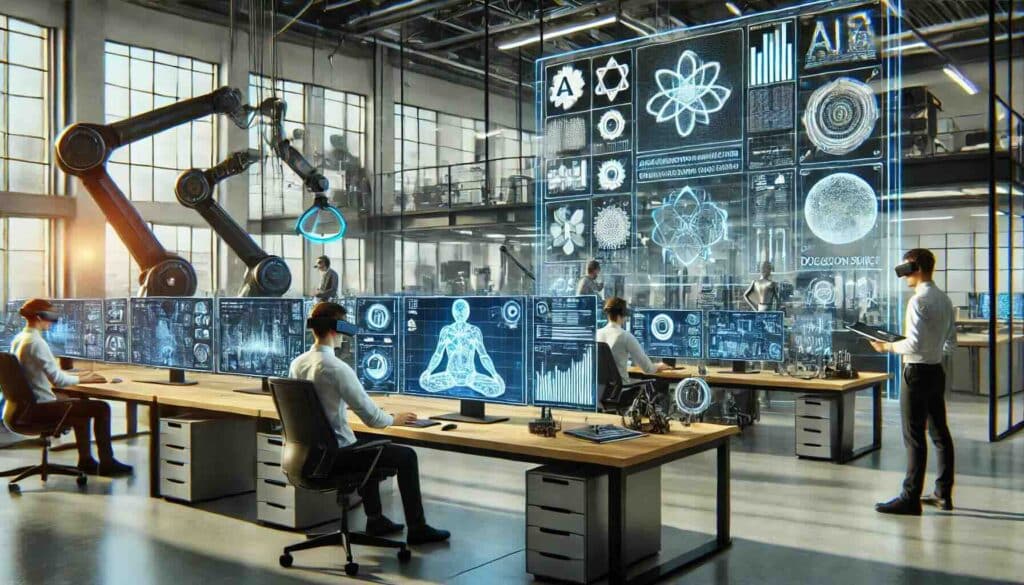
Overview
Many companies want to integrate artificial intelligence (AI) into their operations in today’s rapidly evolving technological landscape. Yet, they often need a clearer understanding of what AI can achieve. This ambiguity can lead to hesitations in adopting AI technologies. To demystify AI and highlight its practical benefits, it is useful to think of it not just as a complex field of technology but as a tool specifically designed to enhance decision-making. In other words, AI can be regarded as a Decision Support System (DSS). This perspective shifts the focus from AI as a buzzword to AI as a fundamental business asset that helps make better decisions faster, thereby driving efficiency, innovation, and market competitiveness. This article explores how AI-based DSS are transforming the field of industrial design and product development, proving essential in navigating the challenges of modern industry.
Introduction
In the era of Industry 4.0, artificial intelligence (AI) is radically transforming various sectors, including industrial design and product development. Among AI tools, Decision Support Systems (DSS) are emerging as fundamental tools to improve efficiency, creativity, and product quality. This article will explore how AI-based DSS can revolutionize the design and development process, highlighting its benefits, practical applications, and future of this technology while emphasizing AI’s supportive role in enhancing the capabilities of engineers and designers.
What is a Decision Support System?
A Decision Support System is a computer system that supports the decision-making process, helping designers and engineers make informed decisions based on data and analysis. DSS integrates data, analytical models, and AI technologies to provide recommendations, forecasts, and simulations. These systems can handle large amounts of data, identify patterns and trends, and provide helpful information to optimize decision-making. Importantly, DSS is designed not to replace human expertise but to augment and enhance the decision-making capabilities of professionals, making their jobs more exciting and impactful.
Benefits of Decision Support Systems in Industrial Design
- Optimization of the Design Process: DSS can analyze historical and current data to identify best practices and optimize the design process. For example, they can suggest optimal materials, shapes, and configurations based on performance and cost data.
- Reduction of Development Times: Using AI algorithms, DSS can automate repetitive and complex tasks, significantly reducing development times. This allows designers to focus on creative and strategic activities.
- Improvement of Product Quality: DSS can simulate different operating conditions and predict product performance, allowing potential problems to be identified and resolved before production. This leads to high-quality products and reduces recall and repair costs.
- Support for Creativity: DSS can generate new design ideas based on data and machine learning algorithms, supporting designers’ creativity. For example, they can suggest unconventional design combinations that may take time to become evident.
Practical Applications of Decision Support Systems
- CAD Design: DSS can be integrated with computer-aided design (CAD) software like CATIA, SolidWorks, and AutoCAD. They can analyze 3D models and suggest modifications to improve product functionality and aesthetics.
- Product Lifecycle Management (PLM): DSS can help manage the entire product lifecycle, from conception to disposal. They can analyze production, usage, and maintenance data to optimize product performance.
- Performance Simulation and Analysis: DSS can simulate realistic operating conditions and analyze product performance. For example, they can predict how a component will behave under different loads, optimizing the design for durability and reliability.
- Mass Customization: DSS can support mass customization by analyzing customer preferences and suggesting personalized product configurations. This allows companies to offer tailor-made products without increasing production costs.
Challenges and limitations that need to be addressed:
AI-based Decision Support Systems (DSS) hold immense potential in industrial design and product development; however, they also come with certain challenges and limitations that need to be addressed:
- Data Quality and Availability:
- Quality: DSS rely heavily on the quality of data they process. Poor, inaccurate, or biased data can lead to incorrect predictions and recommendations, positively impacting the design and development process.
- Availability: In some industries or companies, the required historical and real-time data may not be readily available, limiting the effectiveness of AI-based systems.
- Integration Complexity:
- Integrating DSS with existing systems and processes can be complex and costly. This includes challenges related to compatibility with legacy systems, the need for customized solutions, and the potential disruption of established workflows.
- Skill Gap:
- There may be a significant skill gap in the workforce. Engineers and designers might not be familiar with AI technologies, requiring extensive training and education to effectively use DSS.
- Dependence and Over-reliance:
- Users may become overly reliant on DSS, potentially overlooking or undervaluing their own expertise and intuition in the design process.
- Cost:
- Developing, implementing, and maintaining AI-based systems can be expensive. The initial investment and ongoing costs can be significant barriers, especially for small and medium-sized enterprises.
- Ethical and Security Concerns:
- AI systems can raise ethical concerns, particularly regarding data privacy and the security of sensitive information. There’s also the broader ethical issue of AI making decisions that have substantial impacts on costs, sustainability, and safety.
- Resistance to Change:
- Organizational resistance to change can hinder the adoption of AI-based systems. This includes skepticism about AI capabilities and staff fear of job displacement.
- Maintenance and Updates:
- AI systems require continual maintenance and updates to stay effective, which can be a challenge in rapidly changing industries where new data and parameters frequently emerge.
- Scalability:
- While DSS can be highly effective on a small scale or in controlled scenarios, scaling these systems to handle more complex or larger operations can introduce new challenges, such as handling increased data volumes or maintaining performance consistency across different departments or geographic locations.
Addressing these challenges requires a balanced approach that includes robust data management strategies, continuous training programs, thoughtful integration planning, and ongoing system evaluations to ensure that the DSS continues to meet the evolving needs of industrial design and product development.
The Future of Decision Support Systems
The future of DSS is promising, with new AI technologies such as deep learning and advanced machine learning. These systems will become increasingly intelligent and autonomous, capable of managing complex tasks and making real-time decisions. Furthermore, integrating emerging technologies like augmented reality (AR) and virtual reality (VR) will open new design and product development possibilities.
Case Study: Convergence Consulting
Convergence Consulting, a design and product development leader, has partnered with Innovation Code to successfully start implementing AI-based Decision Support Systems (DSS) to enhance its processes. Together, they have developed cutting-edge 2D drawing automation solutions and product variant generation systems utilizing advanced technologies like TensorFlow and Keras. These innovative tools have reduced development times by 30% and improved product quality by 20%. This collaboration supports and amplifies both companies’ engineers’ and designers’ creative and technical skills, showcasing a successful integration of AI technologies in practical applications.
Conclusion
AI-based Decision Support Systems are revolutionizing the industrial design and product development sector. These tools offer significant efficiency, quality, and creativity benefits, supporting designers and engineers at every process stage. With the continuous advancement of AI technologies, DSS will become increasingly essential for companies that want to remain competitive and innovative in the global market.
Call to Action
Contact Convergence Consulting today to discover how Decision Support Systems can transform your design and product development process. Our experts will guide you in implementing advanced solutions tailored to your needs, helping you achieve new levels of excellence and innovation.

Leave a Reply